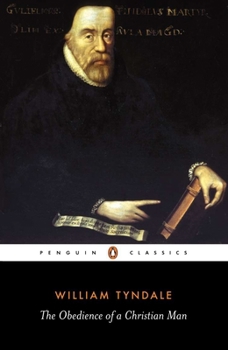The Obedience of a Christian Man
Select Format
Select Condition 
Book Overview
FORASMUCH as our holy prelates and our ghostly religious, which ought to defend God's word, speak evil of it, and do all the shame they can to it, and rail on it; and bear their captives in hand, that... This description may be from another edition of this product.
Format:Paperback
Language:English
ISBN:0140434771
ISBN13:9780140434774
Release Date:October 2000
Publisher:Penguin Group
Length:272 Pages
Weight:0.45 lbs.
Dimensions:0.7" x 5.1" x 7.9"
Age Range:18 years and up
Grade Range:Postsecondary and higher
Customer Reviews
2 ratings
From the Reformation's Genesis
Published by Thriftbooks.com User , 17 years ago
This small book (235 pages of which 26 pages are endnotes) is the second of three texts William Tyndale published in the wake of his 1526 New Testament- the first English Bible. "The Obedience of a Christian Man" ("Obedience") offers considerable early Protestant theology with occasional glimpses into the Reformation as it is happening. "Obedience" is a preeminent primary source. Much of what contemporary English speaking Protestant Christians assume (God is the source of life, God rules through human leaders, leave a place for Divine vengeance, believing leaders should rule with truth, Christ is the believer's mediator before God, etc.) is originally offered here. Writing from the Reformation's genesis, Tyndale is the first to proffer an English theology. Editor David Daniell provides a helpful text with this paperback edition (2000). He alters Tyndale's 16th century language slightly for the sake of contemporary learning. Readers are focused by "Obedience's" idioms and practical theological application as well as amused by its various Reform era words (i.e. "volo", "shriven", aneled", "neverthelater", "menpleasers", etc.). These terms are presented with no textual definition and thus help convey the book's 16th century flavor. These idioms do not distract Tyndale's original theological tenants from effective 21st century application. "Obedience" is somewhat technical and assumes readers' biblical familiarity. Tyndale is replete with Scripture quotes, and illusions. His illustrations are interesting- taken from his 1520s and 30s life as a fugitive from King Henry VIII's sheriffs (William Tyndale was ultimately captured in Belgium and burned as a heretic on October 6, 1536... 470 years ago this month). (Beware, as with all the earliest Protestant Reformers, Tyndale has a pronounced disregard, and verbal dislike, for Roman Catholic clergy and the Pope.) This book is recommended to all 16th century buffs, theology students, church historians, and pastors.
Influential remarkable book written almost 500 years ago
Published by Thriftbooks.com User , 21 years ago
This remarkable book needs to be set in context, it was written almost 500 years ago, during the brutal persecution of those who believed the simple Gospel and in the absolute authority of "Scripture alone". William Tyndale, a gifted scholar educated at Oxford and ordained a priest, saw at first hand the widespread corruption within the Roman Catholic Church Rome held ultimate power, even over the kings and government. The Pope and its bishops believed that they could not err in all matters spiritual. Their core belief was, and still is, that 'Church Tradition' holds equal, if not more authority than the Holy Bible, the infallible, inerrant Word of God. Rome went to extreme lengths to prevent the ordinary folk from having any independent understanding of the Bible, particularly in what it said regarding, purgatory, confessing sins to a priest, selling of indulgences, praying to Mary, praying to Saints, salvation by works and money payments etc. In defiance of the Pope's law Tyndale laid the foundation for the English Reformation when he completed the very first (from original Greek) English translation of the New Testament. This translation differed sharply from the Church's official Latin version, particularly as to how six key words were translated. From the Greek Tyndale translated, "congregation" instead of "church", "elder" instead of "priest", "repentance" instead of "do penance", "love" instead of "charity", "favour" instead of "grace" and "knowledge" instead of "confess". Tyndale's unique gift cut to the bedrock of Papal authority. Matthew 16 v 18 now read, "That thou art Peter, and upon this rock I will build my congregation". One word, congregation, had at a stroke demolished the Pope's claim to be the head of Christ's Church and brought into sharp focus the contradictions of the Papal system, its customs, its practices, its friars, its priests, its bishops and its Pope. Taking his cue from Matthew 7 v 15 & 16 he is scathing with righteous indignation when comparing the simple life and Gospel of Jesus Christ the very Son of God with that of the Pope - "Christ's vicar on earth". This unleashed the full might of the Papacy, Tyndale was hunted across Europe, his New Testament translation and books were burnt, as were people caught holding similar beliefs. In this book Tyndale systematically examines English social and political life; he examines the relationship between church, and state; he sees one social structure created by God and the Christians responsibility within it. He examines the responsibility and obedience of children through to subjects, "what to do if the king, prince or ruler is evil", what to do with "the Popes false power" and how those in positions of responsibility and power ought to rule. Tyndale writes with authority, he knows his Bible intimately, he has an unshakable confidence in the promises of God's Word and he knows with certainty that Truth will triumph regardless of a bleak situation. Tyndale'




